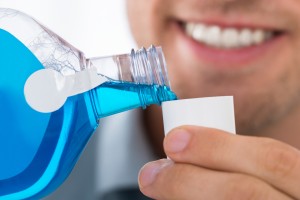Alcohol vs. Alcohol-Free Mouthwash
As you walk up and down the tooth care aisle looking for the right dental products, you will discover two main varieties of mouthwash: alcohol-based and alcohol-free. Most bottles on the shelf contain ethanol, a type of colorless alcohol, but using mouthwash with this ingredient isn’t the right choice for everyone. With a little more information, you can discover whether alcohol or alcohol-free mouthwash is best for you.
Why Do Most Types of Mouthwash Contain Alcohol?
Ethanol is effective at killing germs and bacteria in your mouth, which decreases bacterial plaque buildup and reduces your chance of getting gingivitis. It also helps to dissolve oils in your mouth including menthol, eucalyptol, methyl salicylate, and thymol. This has an antibacterial effect that reduces cavities and prevents gum disease. Overall, rinsing with alcohol-based mouthwash improves your oral hygiene and freshens your breath.
The major downside of alcohol mouthwash is that, with concentrations up to 25 percent, ethanol causes a burning sensation in the mouth. Some people actually enjoy this feeling, which creates the impression that your mouth is getting extra clean. In actuality, the burning sensation results from the drying effect of ethanol.
Some alcohol mouthwash products also contain chlorine compounds, which kill germs but could cause tooth staining. Chlorine can also affect your taste buds when used over the long term.
Does Alcohol-Free Mouthwash Clean Effectively?
You might be thinking—without ethanol, how can alcohol-free mouthwash provide the same bacteria-killing effects? The fact is ethanol isn’t the only ingredient that can kill germs in your mouth and fight tooth decay. Other options include cetylpyridinium chloride (CPC) and chlorhexidine gluconate, the latter of which can be used in mouthwashes with or without alcohol.
Herbal ingredients are also gaining popularity. You can find mouthwash at natural and health food stores made with aloe vera, baking soda, mint oils, and ginger.
Put simply, it’s easy to find an alcohol-free mouthwash that freshens your breath and improves your oral hygiene just as effectively as an ethanol rinse.
Should You Use Alcohol-Free Mouthwash?
With so many mouthwash options out there, you get to decide whether you want to use a traditional alcohol version or switch to alcohol-free. For most people, it comes down to personal preference and whether you like the burning sensation of ethanol. For others, opting for an alcohol-free mouthwash could have definite medical benefits. Plan on avoiding ethanol mouthwash if:
- You have dry mouth: Xerostomia, or dry mouth, is the result of low saliva flow, which can be caused by medication, radiation treatment, or systemic diseases. Because ethanol has a drying effect, you benefit greatly from using alcohol-free mouthwash instead.
- You have burning mouth syndrome: The burning sensation that alcohol mouthwash creates may exacerbate the symptoms of burning mouth syndrome or other oral irritations.
- You have sensitive gums: If you already use special toothpaste for sensitive gums, be sure to choose gentle, alcohol-free mouthwash as well.
- You have diabetes: This disease can cause dry mouth, gum inflammation, and mouth sensitivity that could make swishing with regular mouthwash a painful experience. Get all the benefits without the burn by switching to alcohol-free rinse.
- You’re pregnant: No known quantity of alcohol is considered safe for an unborn baby, so make sure you use alcohol-free mouthwash while pregnant.
- You share your mouthwash with a child: Alcohol rinses could be dangerous for children who might accidentally swallow some, so alcohol-free mouthwash is best if you plan to let a child use it.
A Final Note About Mouthwash
While it’s true that mouthwash is effective at improving your oral hygiene, it should never replace brushing, flossing, or making regular trips to the dentist. Rather, rinsing should complement these important elements of your dental care routine to improve your overall oral health.
Ask Dr. Evanson for Advice About Choosing Mouthwash
If you’re still unsure of what type of mouthwash to use, bring up your concerns at your next dentist appointment with Dr. Evanson. We can recommend choosing an alcohol or alcohol-free version based on any health concerns you have.
For answers to other oral health questions, or to schedule your next dentist appointment, please call Evanson DDS at (720) 409-0008 or contact us online.
Leave a reply →






